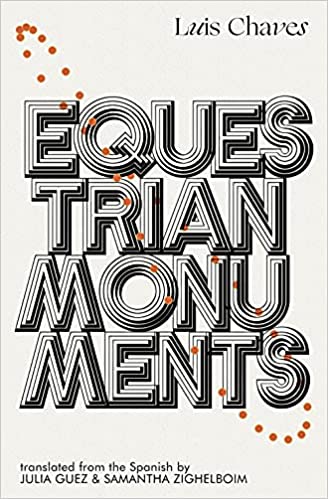
'Equestrian Monuments': Reading Luis Chaves' poetry in English
Originally published by Editorial Germinal in 2011, 'Equestrian Monuments' is Luis Chaves’s seventh book of poetry, and his first published in English.
Luis Chaves is a Costa Rican poet, considered one of the leading figures in contemporary Costa Rican poetry.
After studying Agronomy at the University of Costa Rica, he began to work as a freelance writer. His first collection of poems, El Anónimo, was published by Editorial Guayacán in 1996. Since then, his more than 10 published books have elevated him to one of the most original voices within Latin American literature.

However, it was not until recently that his poetry could be read in English. On Nov. 21, After Hours Editions, an independent New York publisher, launched Equestrian Monuments, his first book of poems to be published in English, translated by Julia Guez and Samantha Zighelboim.
To keep from dwelling on the imminent
let’s speculate about the fate
of a friend from elementary school
who always covered his notebooks in pink.
Or let’s be practical
RELATED CONTENT
and calculate our taxes.
Originally published by Editorial Germinal in 2011, Equestrian Monuments stars the stately figure of a former president, Leon Cortés, who is counterbalanced by a cast of mock-heroic and non-normative foils — a cross-dresser, a mentally disabled individual, little person, thief, and gardener. Dialogue from The Exorcist coexists alongside lines from the Latin "Kyrie, Rex," while sweeping statements about entire generations, continents, and genres find a base in the most intimate details of home life. The intersections are uncanny, sometimes hilarious, and often sad and unsettling. Chaves's hyper-caffeinated imagination renders each image in this remarkable collection in a way that orients the reader and provides a moment's stasis and clarity before "the waves come and the waves erase it."
“Detached from the grandiose and solemn literary pretense of many of his contemporaries, Chaves has often mentioned that his work springs from a simple double gesture of writing in his diary a record of everyday life, just to erase it a couple of minutes later,” observed Costa Rican author Carlos Fonseca in the Los Angeles Review of Books.
"The gift of Chaves’s poems, for me, is in their testimony that our most urgent metaphysical questions exist alongside, if not inside of, the most quotidian ‘stuff’ of our lives,” wrote New York writer Charif Shanahan.
Interviewed by Fonseca at the Los Angeles Review of Books, Chaves says that his interest for poetry began as a kid.
“Since I can remember, I was always following the stories singers told/sang in that kind of music that tell stories. Simple words, simple stories,” he explained.
His parents weren’t intellectuals and didn't have the habit of reading, so what he read in the house were newspapers, the manual of the recently acquired blender, etc.
“I haven’t stopped reading since. One day I decided I wanted to do the same, write books and publish them (not the same thing, we all know). I didn’t follow a formal education in literature; for many years, there was no difference for me between poetry and fiction (or other genres). These separated categories or tags or whatever we want to call them I discovered later. People say he/she is a poet, or he/she is a writer. Two different categories. I know this is how it has been decided, but in my head there is just one: a writer, someone who writes,” he said.












LEAVE A COMMENT: